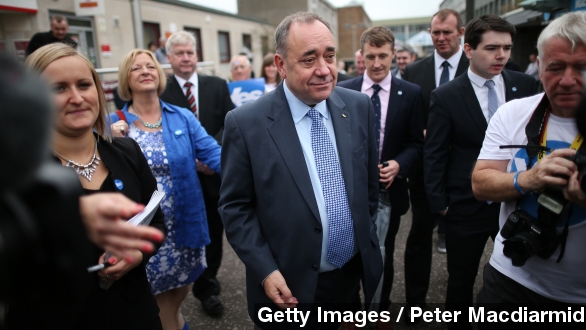Only hours after Scotland vowed to keep its alignment with the United Kingdom, the region lost its longtime political leader and the man who fought for independence, Alex Salmond.
ALEX SALMOND, SCOTLAND'S FIRST MINISTER ON BBC: "For me as leader my time is nearly over, but for Scotland, the campaign continues and the dream shall never die."
Sky News has posted a full transcript of Salmond's speech and his plans to step down once the Scottish National Party elects a new leader.
Salmond has led the SNP for 20 years and served as the nation's first minister — the top political position in Scotland — for the past seven years.
An ITV reporter tweeted the room was transfixed during Salmond's roughly three-minute speech, and the politician's eyes watered as he announced his pending resignation.
Now, the question moves to what U.K. Prime Minister David Cameron does after fighting so long to say this.
DAVID CAMERON, UNITED KINGDOM PRIME MINISTER ON ITV: "They have kept our country of four nations together."
But to keep Scotland around, Cameron and other politicians had to give concessions he knows Wales, Northern Ireland and England will now want, too. (Video via ITV)
Salmond and the independence supporters forced U.K. leaders to uphold the controversial Barnett formula, the U.K. government spending ratio that's generously weighed in Scotland's favor. (Video via Channel 4)
Cameron's conservative Tory colleagues also want devolution for England just like other regions have, meaning only English members of Parliament vote on England-only matters instead of letting other nations' delegates vote. The change to the political landscape in such a scenario would be massive for the U.K.
The Guardian notes, "Some constitutional experts ... say an English parliament would be so disproportionately large compared with the Scots or Welsh parliaments and assemblies that it would almost certainly lead to clashes."
This video includes images from Getty Images.


